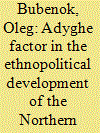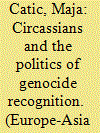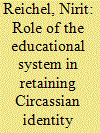| Srl | Item |
| 1 |
ID:
140763


|
|
|
|
|
| Summary/Abstract |
The 150th anniversary of the end of the Caucasian War, which caused havoc in the lives of the Circassians, coincided with the 2014 Winter Olympics in Sochi organized on the land where Circassians (Adyghes) had long lived. These two events revived an interest in the Circassian question and showed that the lacunae in the history of the Adyghes, making an unbiased approach to the issue, impossible should be filled with facts. Repatriation of the Circassians to the Caucasus and a unified Adyghe republic are impossible in Russia’s political reality.
|
|
|
|
|
|
|
|
|
|
|
|
|
|
|
|
| 2 |
ID:
142683


|
|
|
|
|
| Summary/Abstract |
This article examines the evolution and significance of the genocide recognition initiative among Circassians at the turn of the twenty-first century. It argues that, on the most basic level, the Circassian genocide recognition initiative is an identity-driven project, resulting from a fear of extinction that grows out of the experience of being a vulnerable, ethno-national group living with memories of massacres, deportations, exile and fragmentation. Genocide, in effect, becomes a frame used to articulate a seemingly universal Circassian grievance—the fear of extinction—but one that manifests itself in diverse ways on the homeland–diaspora continuum.
|
|
|
|
|
|
|
|
|
|
|
|
|
|
|
|
| 3 |
ID:
093977


|
|
|
|
|
| Publication |
2010.
|
| Summary/Abstract |
The purpose of this article is to examine the role played by the educational system of Kfar Kama in maintaining Circassian identity: how this has been expressed in different periods and what methods have been used as agents of conservation, as an agent of change? What factors have influenced the educational system? What methods did schools choose to employ? The article examines the decision-making processes regarding the school at Kfar Kama, the role of the internal system in determining educational policy, the results of the dialogue with the national state educational system, and what arrangements have been made to enable retention of Circassian culture by the Ottoman, British and Israeli governments.
|
|
|
|
|
|
|
|
|
|
|
|
|
|
|
|